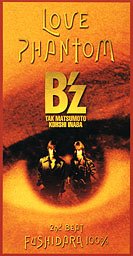
Japanese singer Ayumi Hamasaki has released eighteen studio albums, five compilation albums, twenty-six remix albums, four live albums and numerous singles and promotional singles. She debuted in 1995 under Nippon Columbia with the stage name Ayumi, releasing an extended play Nothing from Nothing, which was a collaboration with Dohzi-T and DJ Bass. Three years later, Hamasaki debuted again as a singer under Avex Trax with the single "Poker Face" (1998). Her first album A Song for ×× (1999) debuted at number one on Oricon's albums chart, and sold over 1.4 million copies.

"First Love" is a song by the Japanese-American singer-songwriter Hikaru Utada. It was released on April 28, 1999, as the third Japanese language single from her second studio album, First Love, which was issued a month previously. It was certified double platinum for 800,000 copies shipped to stores in Japan.
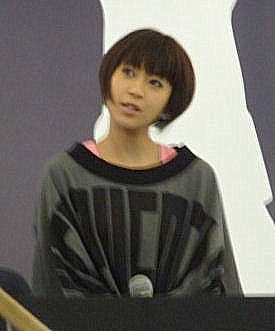
The discography of Japanese-American R&B and pop singer Hikaru Utada consists of eleven studio albums, four compilation albums, eleven video albums and numerous singles and promotional singles. Utada began as a musician in the early 1990s as a member of U3, a family unit made up of her, her mother Junko Utada, also known as 1970s enka singer Keiko Fuji, and her father, musical producer Teruzane Utada. U3 released their debut album Star in 1993, with the hope to debut in America. In 1996, the group was rebranded as Cubic U, an R&B project focusing on Hikaru Utada, resulting in the English language album Precious in 1998 with record label Toshiba EMI.

The solo discography of Ringo Sheena features eight studio albums, five compilation albums, two extended plays and twenty-seven singles. Signing with Toshiba-EMI in 1998, Sheena released her debut single "Kōfukuron" in May 1998, when she was 19 years old. She subsequently released the singles "Kabukichō no Joō" and "Koko de Kiss Shite", the latter becoming her first hit. As of 2014, Sheena has been signed with EMI Records following EMI Music Japan being absorbed into Universal Music Japan.
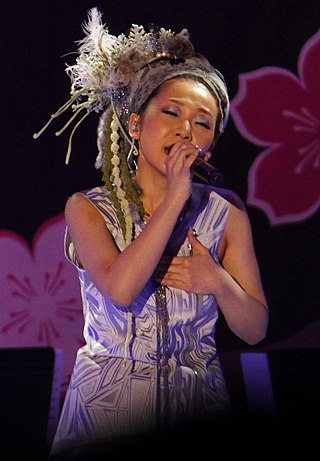
The discography of Japanese R&B singer Misia consists of nine studio albums, three compilation albums, one extended play (EP), one live album, six remix albums, twenty-six singles, twelve promotional singles, eighteen video albums and thirty-seven music videos. In 1997, Misia signed a recording contract with BMG Japan and joined the then up-and-coming talent agency, Rhythmedia. Under the sub-label Arista Japan, Misia released her first single, "Tsutsumikomu Yō ni..." in February 1998, followed by "Hi no Ataru Basho" in May. In June, her debut album, Mother Father Brother Sister, opened at number three on the Oricon chart. The album peaked at number one three weeks later and stayed in the top five for eleven consecutive weeks. Mother Father Brother Sister was certified double million and won a Japan Record Award for Best Album, as well as a Japan Gold Disc Award for Pop Album of the Year. In 2000, Misia's second studio album, Love Is the Message, debuted at number one and was certified double million. It won a Japan Record Award for Best Album and a Japan Gold Disc Award for Pop Album of the Year. The album spawned three top ten hits: "Believe," "Wasurenai Hibi" and "Sweetness." Misia's first remix album, Misia Remix 2000 Little Tokyo, was released three months later and shot to number one. It sold over 800,000 copies and is the second best-selling remix album of all time in Japan.

The discography of Mika Nakashima includes 11 studio albums, 7 compilation albums, 45 singles and 20 video albums. These have all been released through Sony Music Entertainment Japan.
The solo discography of Japanese musician Yui consists of five studio albums, three compilation albums, twenty-one singles and five video albums. These were released on independent label Leaflet Records in 2004, followed by Sony Music Entertainment Japan sub-label Gr8! Records in 2005, Sony Records between 2005 and 2006, Sony sub-label Studioseven Recordings between 2007 and 2010, before returning to Gr8! Records in 2010.

"Beautiful World" is a song by Japanese American musician Hikaru Utada. It served as the theme song for Evangelion: 1.0 You Are (Not) Alone, the 2007 film reboot of the anime Neon Genesis Evangelion. It was released as a double A-side single on August 29, 2007 along with her song "Kiss & Cry", which had been released digitally three months earlier. The song was written and co-produced by Utada, while Akira Miyake and the singer's father Teruzane Utada served as producers. In 2009, a remix of the song, "Beautiful World " served as the theme song of the second film in the series, Evangelion: 2.0 You Can (Not) Advance.

Alone is the ninth single by B'z, released on October 10, 1991. This song is one of B'z many number-one singles in Oricon chart. The single was re-released in 2003, and re-entered at #8. It sold over 1,127,000 copies according to Oricon. It was used as the drama Hotel Woman's theme song. The song was the 10th best selling single of 1991 and the 56th best selling single of 1992, making their only single to chart for two years in the yearly charts.

"Kon'ya Tsuki no Mieru Oka ni" is the twenty-seventh single by B'z, released on February 9, 2000. This song is one of B'z many number-one singles in Oricon chart, and sold over a millions copies, with 1,129,000 copies sold. It was used as the main theme for the TV drama Beautiful Life.

"Ultra Soul" is the thirty-first single by B'z, released on March 14, 2001. This song is one of B'z many number-one singles in Oricon charts. As B-Sides, the single features "Rock Man" and "Suima-Yo 2001!!", a remix of the song "Suima-Yo!!" previously released on the album Survive. "Ultra Soul" was featured in the arcade drumming game Taiko no Tatsujin 2, sequel to the first version of the game that featured another B'z song, "Atsuki Kodō no Hate". This Song was featured in the International Television Intro of 2001 FINA World Aquatics Championships.

"Ocean" is the thirty-ninth single by B'z, released on August 10, 2005. This song is one of the duo's many number-one singles in the Oricon charts, and has sold over 505,000 copies. As B-sides, the single features "Dear My Lovely Pain" and "Narifuri Kamawazu Dakishimete", which is an outtake from The Circle. "Ocean" was used as the theme of Umizaru Evolution, a Japanese television drama adaptation of the manga Umizaru.
The discography of Ayaka consists of six studio albums, two compilation albums, a cover album and numerous singles, released through Warner between 2006 and 2009, and through Ayaka's independent label, A Station, from 2012 onwards.
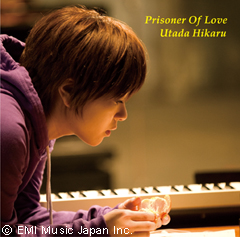
"Prisoner of Love" is Hikaru Utada's 21st Japanese single and 30th single overall. It was cut from her fifth Japanese album, Heart Station (2008), making it her first Japanese recut single in nine years since "First Love" in 1999. "Prisoner of Love" is the theme song for the Fuji TV dorama Last Friends, making it her first song since "Sakura Drops" in 2002 to be used as a main theme song. It was released as a digital download on March 26, 2008, and as a CD single on May 21.

The discography of Japanese pop and electronic dance group Perfume consists of seven studio albums, three compilation albums, twenty-eight singles and six video albums. Forming in 2001, the group debuted as local Hiroshima idols, releasing two singles through the independent Momiji Label. In 2003, the members moved to Tokyo to further their career as idols. Signing with independent label Bee-Hive Records, the group met electronic producer Yasutaka Nakata of the band Capsule, who began to produce their music from 2003 onward.
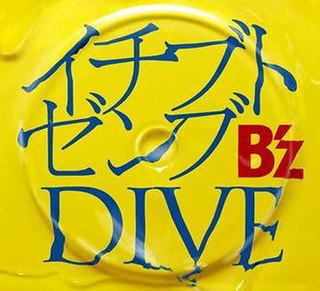
"Ichibu to Zenbu/Dive" is the forty-sixth single by B'z, released on August 5, 2009, as a double A-side. This is one of the many number-one singles by B'z at Oricon Singles Chart. It was a long hit, staying in the top 5 and the top 10 for 8 consecutives weeks. It also reached number one on the Billboard Japan Hot 100 and the Top Singles Sales chart. On December 10, 2009, it was announced that the single won the "Hot 100 of the Year" award at the Billboard Japan Music Awards.
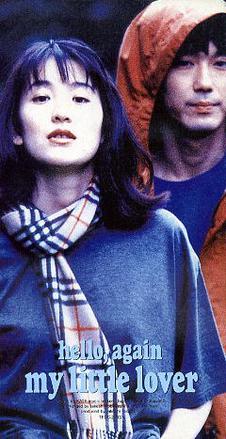
"Hello, Again " is a song by Japanese band My Little Lover. It was released as a single on August 21, 1995, and is currently the band's biggest hit single.

The discography of M-Flo features nine studio albums, nine compilation albums, one live album and 25 singles. These were released on Labsoul Records and Avex Group independent label Rhythm Republic in 1998, and from 1999 onwards released through Rhythm Zone.
The discography of Japanese pop duo Dreams Come True consists of 20 studio albums, 6 compilation albums, 17 video albums, and numerous singles. The band was formed in 1988 by Miwa Yoshida, Masato Nakamura, and Takahiro Nishikawa as Cha-Cha & Audrey's Project, which was later changed to Dreams Come True. The first single "Anata ni Aitakute" did not chart, but their eponymous debut album sold over a million copies in Japan and was certified Million by the Recording Industry Association of Japan (RIAJ). The follow-up albums also performed well on the charts, with the 1989 release Love Goes On... lingering on the Oricon Albums Chart for four years. The group's fifth studio album The Swinging Star (1992) was at one point, the best-selling album in Japan, shifting over 3.7 million copies in the country.
